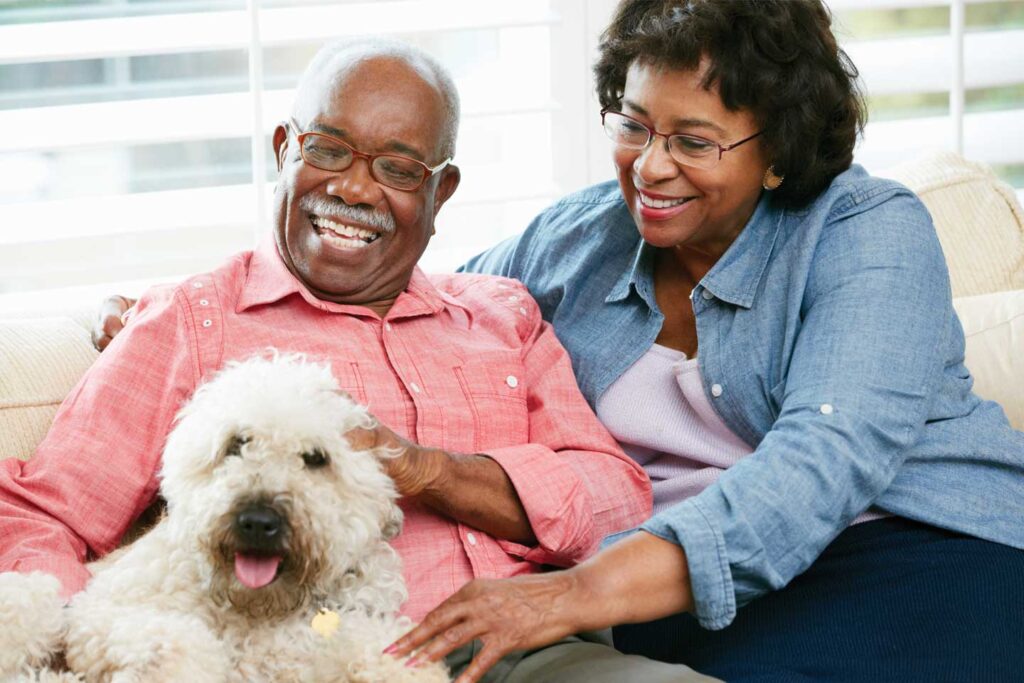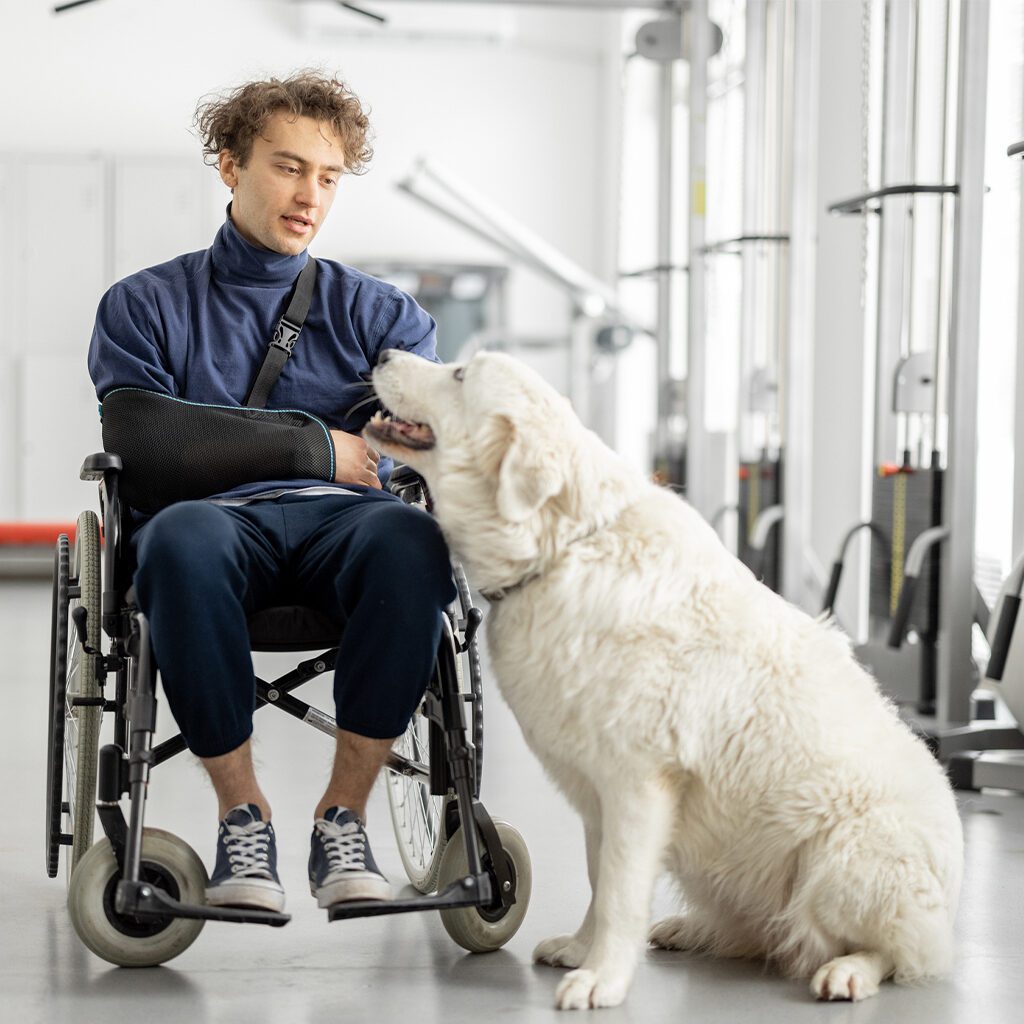How Pets Can Help Seniors Feel Less Lonely & More Engaged
Since loneliness affects both emotional and physical health, caring for an animal that depends on you can make life more enjoyable and even help you feel less pain.
Benefits of Pet Ownership for Older Adults
For seniors able to take care of a pet, having one can bring a wealth of both emotional and physical benefits. To start, pets can help reduce feelings of loneliness, which is a real factor in worsening health for older adults. Senior isolation can also be a risk factor for stroke, obesity, and even cognitive decline. Fortunately, having a pet can turn that around speedily. “Pets can reduce stress, lower blood pressure, and give a sense of comfort to someone,” explains Dr. Micah H. Woods, veterinarian and owner of Ooltewah Veterinary Hospital.


“Most importantly, pets can increase physical activity, which leads to better health.”
A recent study sponsored by AARP found that pet ownership helped seniors enjoy life (88%), feel loved (86%), and reduce stress (79%). Having a pet also helps older adults feel significantly less pain despite living with chronic illnesses, and you can even get a pump of the good-feeling hormone oxytocin in the brain by looking in the eyes of a dog for five minutes! “Pets live for today, which means they take every day as brand new and fresh,” says Dr. Woods. “This rubs off on older adults and can distract them from lingering ailments, disabilities, and sadness.”
If that’s not enough to send you to the humane society for a rescue, don’t forget that caring for a pet also provides a sense of purpose. This can be very beneficial for seniors after retirement or for those dealing with the loss of a loved one. “If someone passes away, a pet can be a living memory,” says Dr. Woods. “It can provide its owner hope and love and remind them of all the good things during their time of loss.” The process of feeding, walking or playing with, and grooming an animal can provide a much-needed sense of responsibility and routine and stave off depression.
A pet will tend to make you more sociable too, as you share cute photos of your bird or venture outside and walk your dog. “Dog parks are another great way for humans and pets alike to socialize and get out of the house,” says Dr. Woods. Animals tend to encourage you to connect with others, which can lower your risk of developing heart disease or having a stroke. That’s a lot of positive effects for a little being.
What About Service Dogs?
Another possibility is a service dog, a book to seniors with disabilities. Service dogs stay with you always and are trained to open and close doors, help prevent falls, retrieve dropped items, or even retrieve walkers or wheelchairs. They can help you get dressed, alert 911 or run to get help in emergencies, and retrieve emergency medication. There are also service dogs with specific skills for either hearing or vision impairments.
Adopt, Don't Shop
Shelter pets are often misunderstood. “People tend to think that animals are at the shelter because they’re ‘bad,'” says Dr. Woods. “In reality, that’s just not the case.” Whether they were left or because they didn’t get along with other pets, they all deserve a second chance to be loved.



What to Consider Before Getting a Pet
You can see that having a pet is a good thing, but take into consideration some key questions. Have you had a pet before? Do you understand the needs of a dog versus a cat or bird? If you have mobility issues, a cat, bird, or fish is likely a better option, since they don’t have to be walked. Choosing an animal with similar activity levels is often the best plan.
If you’re still active, a well-trained, healthy adult dog might make the most sense. “A common misconception with dogs is that they’re considered adults when they’re 1-2 years old,” says Dr. Woods. “Those dogs are actually still in their adolescence and will need almost as much training as a 6-week-old puppy. Senior dogs make great pets for older adults because they tend to be more relaxed, and they’re potty-trained!”
If you are still able to get around fairly well but a little hesitant to consider all the responsibilities of a pet, you might find a family member or friend who would consider being a co-caretaker. They could handle some of the harder aspects of pet ownership, like cleaning a litter box or cage, and give you more social interactions at the same time.
There are also financial concerns you need to be mindful of, such as vet fees, grooming, and food or medicines. Rover.com estimates some dog owners spend as much as $153 a month, or $1,836 each year, to care for a dog (though many households spend much less). The American Society for the Prevention of Cruelty to Animals reports that cats typically run about $670 for a year, small birds cost around $200, and a fish only $35 annually after purchasing the aquarium.
And, if you decide a pet is right for you, be sure to get any potential friend checked by a veterinarian first. The goal is to find a good companion for you that you can easily care for. Your well-being is the primary goal.
There are many questions to be answered about what kind of pet, what level of activity you can handle, how much you are comfortable doing, and what appeals to you on an elemental level. No pet is perfect for everyone, and your honest appraisal of your abilities will help you figure it out. But making a new friend, whether it sports fur, fins, or feathers, can bring a new source of joy to the next stage of your life.



Dr. Micah H. Woods
Veterinarian & Owner, Ooltewah Veterinary Hospital

